Masarap gawin maging sa tag-ulan ang magkape
Walang pagtatangi, namimis ko talaga ang araw sa tag-init.
Hay, ang araw na mainit.
Madalas kasing napapanaginipan ko; at ayaw mawaglit
Ang ituktok ng talon
Mas mataas ang guryon
Na kumikiwal sa hangin
At naghahamon sa lawin
Hay, ang pakiramdam
Sa lilim ng dalampasigan
Yungyong ng kawayan
At bulong ng amihan
Tinatangay ako
Painlan-lang…
Thursday, August 24, 2006
Saturday, August 19, 2006
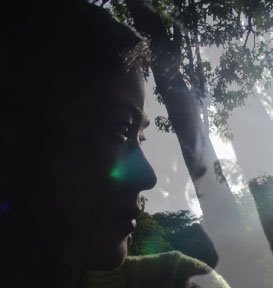
Walang Pagkukulang*
WALA kang pagkukulang bagkus;
Ika’y sobra
Sobra sa aking inaasahang pagbuhos
Ng Tala
Ng Alon
Ng Ulan
Ng Buwan
Ng Sinag
Ng Takipsilim na
Nakakapagpaiyak sa akin
Sa Musmos kong
Damdamin
Mahal kita.
Walang pagkukulang.
Ang singkit mong mga
Mata ng aking kaluluwa
Nais kong makita
Hanggang kabilang-dulo ng mundo
(Kung saan man yun)
Aasahan kong ang mga talulot
Ng Payak
At Masalimuot
Na lambing; siphayo
Nitong pagmamahalan.
Walang pagkukulang.
Walang Hangganan.
*Alay sa’yo sa ika-19 ng Agosto
Evidences, Testimonies, Point to Accused U.S. Marine
As the prosecution panel in the Subic rape case trial ends its presentation of witnesses and evidence, its lawyers are confident that they have pieced out the puzzle showing the four accused U.S. Marines guilty.
BY JHONG DELA CRUZ
Bulatlat
Prosecution lawyers in the Subic rape case ended their presentation on Aug. 17, with a police expert confirming that the DNA sample found in the Filipina victim’s underwear indeed belonged to principal accused Lance Corporal Daniel Smith.
Lead prosecutor Evalyn Ursua expressed confidence their evidences and the witnesses’ testimonies had pieced out the puzzle of the fateful Nov. 1, 2005 when four U.S. Marines allegedly raped a 22-year-old Filipino woman.
Also accused with Smith are Lance Corporals Dominic Duplantis and Keith Silkwood and Staff Sergeant Chad Carpentier.
23rd witness
The prosecution presented its 23rd witness, Sr. Inspector Edmar dela Torre who conducted the matching of both DNA samples extracted from the victim’s panties and Smith’s blood.
Tested at the Philippine National Police Crime Laboratory, Dela Torre said the samples were of “primary match,” resulting in a 10 percent accuracy rate. The DNA sample obtained from the victim’s underwear had not been contaminated, bearing no such indication during the test, dela Torre told the court.
The analyst received the samples on June 26 from the evidence custodian. His findings, he told the court, revealed that the “DNA is that of Daniel Smith.” The defense refused to further ask questions during the cross-examination.
Meanwhile, before the police analyst took the witness stand, the Makati Regional Trial Court Branch 139 recalled Dr. Rolando Ortiz, medico-legal officer at the James L. Gordon Hospital who examined “Nicole” on Nov. 3, 2005.
The court had ordered Ortiz to testify again to explain the history-taking procedure he had conducted with “Nicole.” The procedure involves inquiring about past and present sexual relationships of victims of sexual assault.
Ursua opposed this saying having sex in the past would not indicate that there was no rape because the assault could happen even inside a marriage. She cited section 6 of the Rape Shield Law which said that “in prosecutions for rape, evidence of complainant's past sexual conduct, opinion thereof or his/her reputation, shall not be admitted unless, and only to the extent that the court finds that such evidence is material and relevant to the case.”
Fishing expedition
The victim, a Zamboanga native, told the doctor she last had a consensual sexual intercourse with her boyfriend two years ago, Ortiz said.
The defense argued old-healed lacerations in both sides of the labia minora, if proven there had been such activity before the alleged rape, the findings might change in the medico-legal procedure.
But Ursua asked the court to reconsider the question saying the defense panel is engaged in a “fishing expedition” because the answer might have no boundaries and that this would only “humiliate” the complainant.
Asked why there was no spermatozoa found in the vagina by Judge Benjamin Pozon during the court’s clarificatory questions, Dr. Ortiz answered because there might have been no ejaculation at all, or that the accused had used condom during the alleged sexual assault.
Earlier, Ortiz had testified the reddish contusions on both sides of the labia minora were caused by “a blunt object applied with force.” He re-affirmed the findings when asked by Pozon whether it might have been caused by illness, and:
“Contusions may be caused when a woman’s private part is not lubricated, or [if her] thighs are closed injury could occur during the penetration,” he said.
Corroborated
After 23 witnesses, the prosecution concluded they were very satisfied with how the proceedings for their evidences and witness testimonies corroborated the claim of the complainant.
The victim had earlier testified she was too drunk to fight Smith during the sexual assault. She described him as heavy when she gained consciousness and found out he was on top of her.
She was having a vacation with her two sisters at the former U.S. naval base when, according to her, she was intoxicated by alcoholic drinks.
She only remembered refusing Smith’s insistence to get out of the Neptune Club, a popular nightspot at the Freeport. Later she knew she was taken inside the van where she claimed to have been raped at the backseat.
On July 11, leading forensic expert Dr. Raquel Fortun confirmed that the injuries sustained by Nicole indicate that rape and not consensual sex took place on the night of Nov. 1 last year. This is because in a normal consensual sexual activity, injuries in the genitalia are unusual, she said.
Less than 10
The court will resume hearing on Sept. 11 when the defense panel will present its side.
Last June, Ursua filed a petition for certiorari seeking full custody of the four U.S. servicemen involved in the rape case. If granted, this would prevent the soldiers from “getting off the hook,” since the case would no longer follow the one year allowable case hearing for U.S. soldiers in the country. The prosecution is battling the December 29 deadline of the court proceedings.
If proven guilty, the accused would be meted out a 40-year imprisonment. Bulatlat
BY JHONG DELA CRUZ
Bulatlat
Prosecution lawyers in the Subic rape case ended their presentation on Aug. 17, with a police expert confirming that the DNA sample found in the Filipina victim’s underwear indeed belonged to principal accused Lance Corporal Daniel Smith.
Lead prosecutor Evalyn Ursua expressed confidence their evidences and the witnesses’ testimonies had pieced out the puzzle of the fateful Nov. 1, 2005 when four U.S. Marines allegedly raped a 22-year-old Filipino woman.
Also accused with Smith are Lance Corporals Dominic Duplantis and Keith Silkwood and Staff Sergeant Chad Carpentier.
23rd witness
The prosecution presented its 23rd witness, Sr. Inspector Edmar dela Torre who conducted the matching of both DNA samples extracted from the victim’s panties and Smith’s blood.
Tested at the Philippine National Police Crime Laboratory, Dela Torre said the samples were of “primary match,” resulting in a 10 percent accuracy rate. The DNA sample obtained from the victim’s underwear had not been contaminated, bearing no such indication during the test, dela Torre told the court.
The analyst received the samples on June 26 from the evidence custodian. His findings, he told the court, revealed that the “DNA is that of Daniel Smith.” The defense refused to further ask questions during the cross-examination.
Meanwhile, before the police analyst took the witness stand, the Makati Regional Trial Court Branch 139 recalled Dr. Rolando Ortiz, medico-legal officer at the James L. Gordon Hospital who examined “Nicole” on Nov. 3, 2005.
The court had ordered Ortiz to testify again to explain the history-taking procedure he had conducted with “Nicole.” The procedure involves inquiring about past and present sexual relationships of victims of sexual assault.
Ursua opposed this saying having sex in the past would not indicate that there was no rape because the assault could happen even inside a marriage. She cited section 6 of the Rape Shield Law which said that “in prosecutions for rape, evidence of complainant's past sexual conduct, opinion thereof or his/her reputation, shall not be admitted unless, and only to the extent that the court finds that such evidence is material and relevant to the case.”
Fishing expedition
The victim, a Zamboanga native, told the doctor she last had a consensual sexual intercourse with her boyfriend two years ago, Ortiz said.
The defense argued old-healed lacerations in both sides of the labia minora, if proven there had been such activity before the alleged rape, the findings might change in the medico-legal procedure.
But Ursua asked the court to reconsider the question saying the defense panel is engaged in a “fishing expedition” because the answer might have no boundaries and that this would only “humiliate” the complainant.
Asked why there was no spermatozoa found in the vagina by Judge Benjamin Pozon during the court’s clarificatory questions, Dr. Ortiz answered because there might have been no ejaculation at all, or that the accused had used condom during the alleged sexual assault.
Earlier, Ortiz had testified the reddish contusions on both sides of the labia minora were caused by “a blunt object applied with force.” He re-affirmed the findings when asked by Pozon whether it might have been caused by illness, and:
“Contusions may be caused when a woman’s private part is not lubricated, or [if her] thighs are closed injury could occur during the penetration,” he said.
Corroborated
After 23 witnesses, the prosecution concluded they were very satisfied with how the proceedings for their evidences and witness testimonies corroborated the claim of the complainant.
The victim had earlier testified she was too drunk to fight Smith during the sexual assault. She described him as heavy when she gained consciousness and found out he was on top of her.
She was having a vacation with her two sisters at the former U.S. naval base when, according to her, she was intoxicated by alcoholic drinks.
She only remembered refusing Smith’s insistence to get out of the Neptune Club, a popular nightspot at the Freeport. Later she knew she was taken inside the van where she claimed to have been raped at the backseat.
On July 11, leading forensic expert Dr. Raquel Fortun confirmed that the injuries sustained by Nicole indicate that rape and not consensual sex took place on the night of Nov. 1 last year. This is because in a normal consensual sexual activity, injuries in the genitalia are unusual, she said.
Less than 10
The court will resume hearing on Sept. 11 when the defense panel will present its side.
Last June, Ursua filed a petition for certiorari seeking full custody of the four U.S. servicemen involved in the rape case. If granted, this would prevent the soldiers from “getting off the hook,” since the case would no longer follow the one year allowable case hearing for U.S. soldiers in the country. The prosecution is battling the December 29 deadline of the court proceedings.
If proven guilty, the accused would be meted out a 40-year imprisonment. Bulatlat
Sunday, August 13, 2006
Lack of Justice Sickens the Poor
2 rights lawyers decry breakdown of law under Arroyo
“The poor should have a way to use the justice system for their benefit. The high price of pursuing justice makes the poor choose to evade it.” – FLAG lawyer Jose Manuel Diokno
By Jhong dela Cruz
Bulatlat
The relatives of 21-year-old Jonas “Chukoy” Nucum and his brother, Tonton, could only gnash their teeth in anger over their death. They couldn’t immediately bring to court the victims’ alleged killers and they don’t trust the prevailing justice system in the country.
Chukoy died instantly when his throat was slit-open with a knife by a gang member in the urban poor community of Bambang, Tondo on June 2. He was a member of the militant youth Anakbayan (nation’s youth) at the time of his death.
Family shock did not end with Chukoy’s killing. An ex-policeman fired a warning shot in a youth ramble that ensued after the killing. A bullet hit Tonton, 19-year-old brother of Chukoy, when he dashed to take his brother to the Jose Reyes Memorial Hospital. Tonton, also an active member of Anakbayan, also died.
Marietta Nucum, 42, the victims’ aunt, said in a Bulatlat interview, “Hindi kami umaasa na mabigyan ng katarungan yung mga bata” (We’re not hoping justice will be served in the brothers’ killing).
What adds to Marietta’s doubt that justice will be served for her nephews is that persons implicated in the killings are reportedly protected by an influential businessman in Tondo, home to several slum communities which, according to police reports, also remains crime-infested.
In the killings of Chukoy and Tonton, it took their kin two months before they could file formal complaints against the suspects on August 2.
Wenceslao Nucum, father of the victims, said they had filed criminal charges against one Noli also known as (a.k.a.) “Buddha” and Paul Vinirao, for two counts of murder.
Homicide
Nucum said the Bambang police station tried to reduce the charges to homicide. He opposed this, he said, insisting that the accounts of the killing clearly spelled murder. “We’re awaiting subpoena to be issued against the suspects,” he said in Filipino.
Murder suspect Vinirao used to be active with the Philippine Constabulary (PC), now the Philippine National Police (PNP). At the height of youth activism during martial law, he was reportedly involved in the arrests and disappearances of organizers of people’s organizations in Tindalo, Tondo.
Vinirao is now a “right hand” of a former PC man who now runs a chain of medical supply shops in Ermita, Manila. Noli, Chukoy’s alleged killer, also works for the shop owner. The suspects’ link to the businessman, who is apparently influential in Tondo, might elude them from being prosecuted, Nucum said.
“Areglo” has also come into play in the victims’ case. “Areglo” is an extra-legal deal that involves money aimed at silencing a victim or his relatives.
“They tried to bribe us with money,” Nucum said, declining to state an amount. Also, the other party has lobbied with village officials, particularly the chairman, to settle the case through “areglo” to which Chairman Ben Fernando refused. Tonton was serving as baranggay tanod (village security) at the time of his death.
The Nucum brothers’ killings happened amid the spate of politically-motivated murders that, to date, have claimed 725 lives across the country. Among those killed were leaders and members from Anakbayan, League of Filipino Students and other youth-student organizations.
Military
Although the military is widely believed to be behind the killings, not one suspect has been arrested and complaints against many suspects have not been pursued by law enforcement and justice authorities. Like many of the victim’s relatives, those of the Nucum brothers are pessimistic about the outcome of the two cases.
Two prominent human rights lawyers tend to share this public sentiment. Lawyer Manuel Jose Diokno, chair of Free Legal Assistance Group (FLAG), laments that no change has taken place in the judicial system especially since 2001 when President Gloria Macapagal-Arroyo was installed into office.
Diokno told Bulatlat that the widening economic gap between the rich and poor is tied to how the land’s judicial system upholds the poor’s rights. In pursuit of justice, the poor are pushed to the edge, even choosing to get justice in their own hands, Diokno said in an interview.
“Wala kaming nakikitang pagbabago sa hustisya natin sa bansa mula nang maluklok sa puwesto si Arroyo” (We don’t see any change in the country’s justice since Arroyo came into power), he said. The bias of the law for those who could pay and against those who cannot has not changed, he said.
Another lawyer, Neri Colmenares of the Counsels for the Defense of Civil Liberties (CODAL) said the institutions that are supposed to uphold the integrity of justice have been eroded by the personal favors of the administration.
“The role of the judiciary, the prosecution and the investigation do not function well to provide justice for the poor,” he said in a phone interview. “Normally, our justice system does not work for the poor, but now it has worsened because it has been used against perceived enemies of the government,” he added.
Accessibility
Diokno said that the first step toward reform in the justice system is to make it accessible to the poor.
“The poor should have a way to use the justice system for their benefit,” he said. “The high price of pursuing justice makes the poor choose to evade it.”
Many poor people languish in jail simply because they are poor, Colmenares maintained. “They cannot afford the service of lawyers,” he said.
Processes and proceedings in a criminal or civil case that normally takes three years upon filing entail huge amount of money.
According to the CODAL lawyer, acceptance fee for hiring private lawyers is pegged at P30,000, with lawyer’s fee ranging P2,000-P3,000 for every hearing. The court conducts at least six to 10 hearings for a case a year.
Investigation and basic evidence gathering would cost a complainant P20,000-P30,000, as well as court fees, which include payments for transcript and docket fee.
The complainant would pay up the same amount if the defendant files an appeal after conviction.
In attending to the court’s hearings, and in keeping the witnesses, an aggrieved party would also need some P20,000-P30,000.
Pro bono legal assistance provided by “overworked but underpaid” fiscals from the Public Attorneys Office, also comes at a price. Although they are prohibited from collecting fees, some public counsels ask for payment between P5,000-P10,000.
Money talks
But being poor should not be a factor to prove acquittal or guilt, said Colmenares. Long-time imprisonment on grounds of being unable to afford an attorney is itself injustice, he said.
In the remaining three-and-a-half years of Arroyo, rights lawyers foresee the judicial system would deteriorate.
“Kung walang pagbabago sa paglilitis ng kaso dito, lalo lang lalala ang sitwasyon natin…kung sira ang legal system wala na tayong mapupuntahan. Ganun ang nakikita naming direksyon sa ilalim ni Arroyo,” said Diokno. The FLAG chair handles the case of the Tagaytay 5, who were detained on suspicion of being involved in a recent coup plot. Bulatlat
2 rights lawyers decry breakdown of law under Arroyo
“The poor should have a way to use the justice system for their benefit. The high price of pursuing justice makes the poor choose to evade it.” – FLAG lawyer Jose Manuel Diokno
By Jhong dela Cruz
Bulatlat
The relatives of 21-year-old Jonas “Chukoy” Nucum and his brother, Tonton, could only gnash their teeth in anger over their death. They couldn’t immediately bring to court the victims’ alleged killers and they don’t trust the prevailing justice system in the country.
Chukoy died instantly when his throat was slit-open with a knife by a gang member in the urban poor community of Bambang, Tondo on June 2. He was a member of the militant youth Anakbayan (nation’s youth) at the time of his death.
Family shock did not end with Chukoy’s killing. An ex-policeman fired a warning shot in a youth ramble that ensued after the killing. A bullet hit Tonton, 19-year-old brother of Chukoy, when he dashed to take his brother to the Jose Reyes Memorial Hospital. Tonton, also an active member of Anakbayan, also died.
Marietta Nucum, 42, the victims’ aunt, said in a Bulatlat interview, “Hindi kami umaasa na mabigyan ng katarungan yung mga bata” (We’re not hoping justice will be served in the brothers’ killing).
What adds to Marietta’s doubt that justice will be served for her nephews is that persons implicated in the killings are reportedly protected by an influential businessman in Tondo, home to several slum communities which, according to police reports, also remains crime-infested.
In the killings of Chukoy and Tonton, it took their kin two months before they could file formal complaints against the suspects on August 2.
Wenceslao Nucum, father of the victims, said they had filed criminal charges against one Noli also known as (a.k.a.) “Buddha” and Paul Vinirao, for two counts of murder.
Homicide
Nucum said the Bambang police station tried to reduce the charges to homicide. He opposed this, he said, insisting that the accounts of the killing clearly spelled murder. “We’re awaiting subpoena to be issued against the suspects,” he said in Filipino.
Murder suspect Vinirao used to be active with the Philippine Constabulary (PC), now the Philippine National Police (PNP). At the height of youth activism during martial law, he was reportedly involved in the arrests and disappearances of organizers of people’s organizations in Tindalo, Tondo.
Vinirao is now a “right hand” of a former PC man who now runs a chain of medical supply shops in Ermita, Manila. Noli, Chukoy’s alleged killer, also works for the shop owner. The suspects’ link to the businessman, who is apparently influential in Tondo, might elude them from being prosecuted, Nucum said.
“Areglo” has also come into play in the victims’ case. “Areglo” is an extra-legal deal that involves money aimed at silencing a victim or his relatives.
“They tried to bribe us with money,” Nucum said, declining to state an amount. Also, the other party has lobbied with village officials, particularly the chairman, to settle the case through “areglo” to which Chairman Ben Fernando refused. Tonton was serving as baranggay tanod (village security) at the time of his death.
The Nucum brothers’ killings happened amid the spate of politically-motivated murders that, to date, have claimed 725 lives across the country. Among those killed were leaders and members from Anakbayan, League of Filipino Students and other youth-student organizations.
Military
Although the military is widely believed to be behind the killings, not one suspect has been arrested and complaints against many suspects have not been pursued by law enforcement and justice authorities. Like many of the victim’s relatives, those of the Nucum brothers are pessimistic about the outcome of the two cases.
Two prominent human rights lawyers tend to share this public sentiment. Lawyer Manuel Jose Diokno, chair of Free Legal Assistance Group (FLAG), laments that no change has taken place in the judicial system especially since 2001 when President Gloria Macapagal-Arroyo was installed into office.
Diokno told Bulatlat that the widening economic gap between the rich and poor is tied to how the land’s judicial system upholds the poor’s rights. In pursuit of justice, the poor are pushed to the edge, even choosing to get justice in their own hands, Diokno said in an interview.
“Wala kaming nakikitang pagbabago sa hustisya natin sa bansa mula nang maluklok sa puwesto si Arroyo” (We don’t see any change in the country’s justice since Arroyo came into power), he said. The bias of the law for those who could pay and against those who cannot has not changed, he said.
Another lawyer, Neri Colmenares of the Counsels for the Defense of Civil Liberties (CODAL) said the institutions that are supposed to uphold the integrity of justice have been eroded by the personal favors of the administration.
“The role of the judiciary, the prosecution and the investigation do not function well to provide justice for the poor,” he said in a phone interview. “Normally, our justice system does not work for the poor, but now it has worsened because it has been used against perceived enemies of the government,” he added.
Accessibility
Diokno said that the first step toward reform in the justice system is to make it accessible to the poor.
“The poor should have a way to use the justice system for their benefit,” he said. “The high price of pursuing justice makes the poor choose to evade it.”
Many poor people languish in jail simply because they are poor, Colmenares maintained. “They cannot afford the service of lawyers,” he said.
Processes and proceedings in a criminal or civil case that normally takes three years upon filing entail huge amount of money.
According to the CODAL lawyer, acceptance fee for hiring private lawyers is pegged at P30,000, with lawyer’s fee ranging P2,000-P3,000 for every hearing. The court conducts at least six to 10 hearings for a case a year.
Investigation and basic evidence gathering would cost a complainant P20,000-P30,000, as well as court fees, which include payments for transcript and docket fee.
The complainant would pay up the same amount if the defendant files an appeal after conviction.
In attending to the court’s hearings, and in keeping the witnesses, an aggrieved party would also need some P20,000-P30,000.
Pro bono legal assistance provided by “overworked but underpaid” fiscals from the Public Attorneys Office, also comes at a price. Although they are prohibited from collecting fees, some public counsels ask for payment between P5,000-P10,000.
Money talks
But being poor should not be a factor to prove acquittal or guilt, said Colmenares. Long-time imprisonment on grounds of being unable to afford an attorney is itself injustice, he said.
In the remaining three-and-a-half years of Arroyo, rights lawyers foresee the judicial system would deteriorate.
“Kung walang pagbabago sa paglilitis ng kaso dito, lalo lang lalala ang sitwasyon natin…kung sira ang legal system wala na tayong mapupuntahan. Ganun ang nakikita naming direksyon sa ilalim ni Arroyo,” said Diokno. The FLAG chair handles the case of the Tagaytay 5, who were detained on suspicion of being involved in a recent coup plot. Bulatlat
Friday, August 11, 2006
AETA

IN CENTURIES OVER, AETAS WERE REGARDED AS CLASSIC MINORITY. TODAY, THEIR BEING MINORITY HAS PROPELLED THEM TO TAKE UP ARMS TO SURVIVE.TEXT AND PHOTOS BY JHONG DELA CRUZ
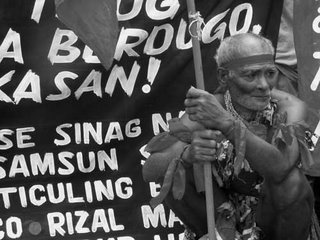 A tribe member prefers not to sit on the issues that confront his sector, often regarded as 'monitority'
A tribe member prefers not to sit on the issues that confront his sector, often regarded as 'monitority' The Aetas put up a ritual called 'talbeg' where they butchered a pig to denounce the spate of killings that has already claimed 725 lives. At least 72 have been killed belonging to indigenous tribes
The Aetas put up a ritual called 'talbeg' where they butchered a pig to denounce the spate of killings that has already claimed 725 lives. At least 72 have been killed belonging to indigenous tribes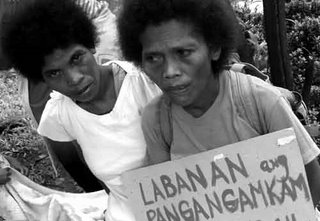 Aeta women are warriors too, coming to the protest to fight destructive development projects...
Aeta women are warriors too, coming to the protest to fight destructive development projects...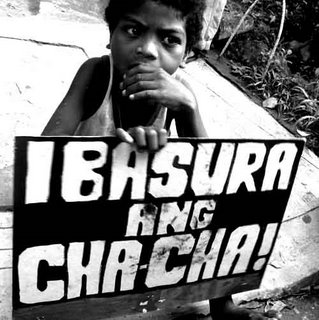 ...And kids too
...And kids too Straight from Zambales, Aetas picket the government's environment department
Straight from Zambales, Aetas picket the government's environment department Peering through a gate, this Aeta kid had seen the excesses of development projects to tribes at early age
Peering through a gate, this Aeta kid had seen the excesses of development projects to tribes at early age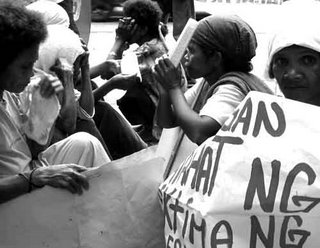 Now beyond the kitchen and their houses, these Aeta mothers also trooped to the protest
Now beyond the kitchen and their houses, these Aeta mothers also trooped to the protest The string instrument played by a mother, is known traditionally as "gitaha"
The string instrument played by a mother, is known traditionally as "gitaha" Shyly, youngsters, in tow by their mothers, join the protest
Shyly, youngsters, in tow by their mothers, join the protest
Subscribe to:
Posts (Atom)
